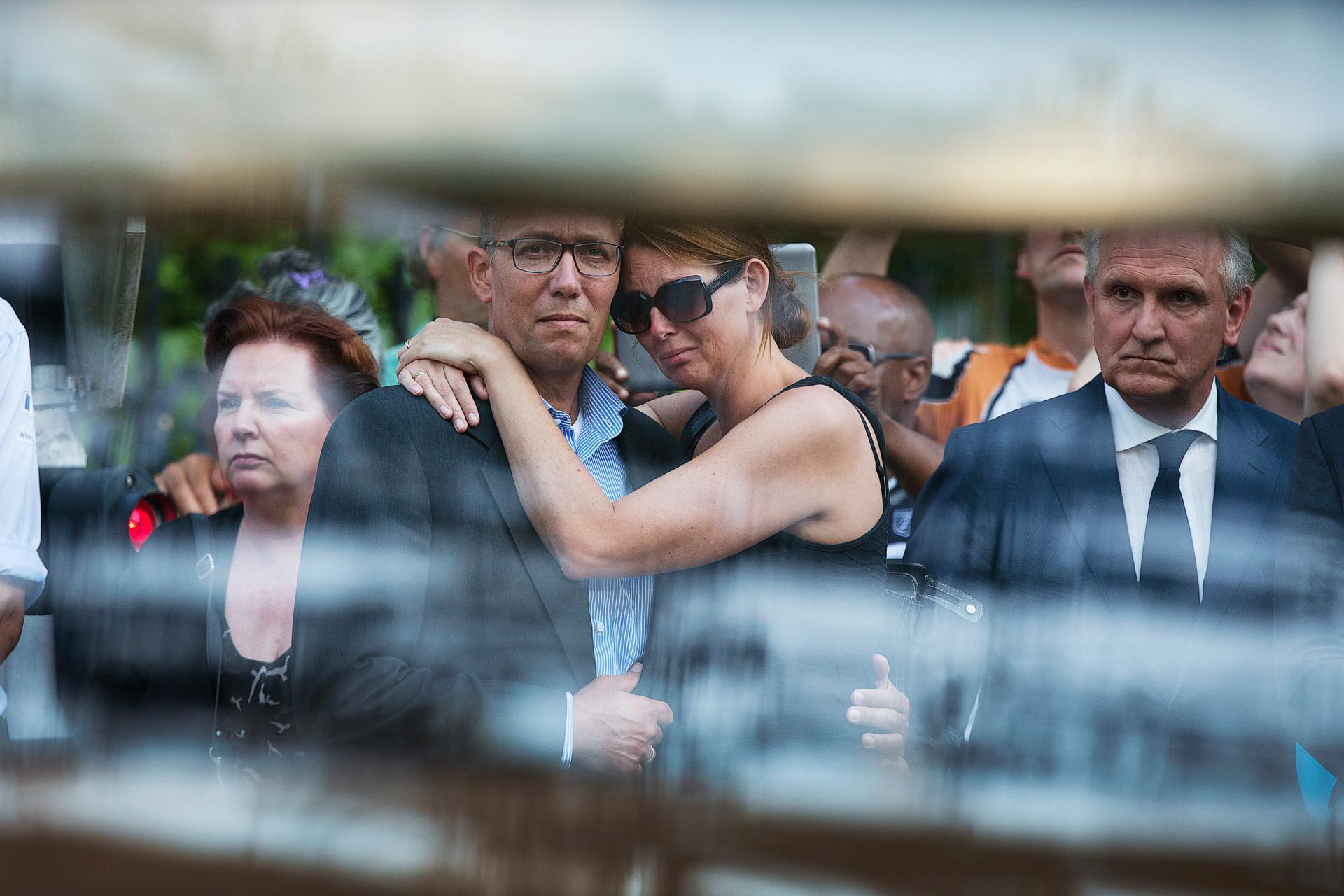The Dutch consider how an airline tragedy might change their society
Family members of the victims killed in Malaysia Airlines Flight MH17 plane disaster are seen through the window of a hearse carrying the victims’ bodies.
Members of the Dutch royalty and politicians on Wednesday met a plane carrying the remains of 40 victims from Malaysia Airlines Flight 17 at Eindhoven airbase.
They chose not to make speeches, instead, gathering in silence. They looked on as coffin after coffin moved from a military plane to a waiting hearse, each with its own honor guard.
The 40 hearses then left in a long procession, carried live on Dutch TV.
Dutch journalist Margo Smit called it a somber, but moving, ceremony.
"That's also the mood in the Netherlands today. People are really happy that the remains of the victims are coming back … because that was of the essence and that is something people were a little bit angry about over the last couple of days, that it took so long," Smit says. "But now that they're coming back, and finally things seem to be moving, the mood is maybe going to the next stage of mourning, where it's sinking in that something terrible has happened."
Smit, who directs the Dutch-Flemish Investigative Journalism Association, says before the tragedy, Dutch interest in the conflict in eastern Ukraine was somewhat limited.
"For a lot of people, that was something happening in eastern Europe and they would probably never go there. Our soccer team played there two years ago during the European championships, but they didn't do very well so we'd rather forget," she says. "People will be more interested now … but I think the interest may fade again. That's how fickle we are as people, I guess."
Smit says the Dutch are debating just how journalists are covering the tragedy. This weekend, a Dutch reporter at the crash site found a diary of one of the victims. She started leafing through it and read a fragment aloud on camera.
"Like the Australian journalist that was caught rummaging through the luggage that was found at the crash site, there was quite an outcry about this," Smit says. "The TV show that put this on had to apologize pretty strongly."
But Smit notes some Dutch media are showing restraint, including newspapers that have declined to print the victims' names, even though the passenger list has been published. And some Dutch mayors, she says, are calling on the press to respect the privacy of the families of victims in their towns.
The remains of the victims that arrived in the Netherlands today have been transported to an army barracks in Hilversum for identification. The Dutch city lost 13 of its residents, including two entire families.
"I drove through there this morning and I saw quite a few flags flying at half-mast," Smit says. "It's a sad atmosphere there."
Members of the Dutch royalty and politicians on Wednesday met a plane carrying the remains of 40 victims from Malaysia Airlines Flight 17 at Eindhoven airbase.
They chose not to make speeches, instead, gathering in silence. They looked on as coffin after coffin moved from a military plane to a waiting hearse, each with its own honor guard.
The 40 hearses then left in a long procession, carried live on Dutch TV.
Dutch journalist Margo Smit called it a somber, but moving, ceremony.
"That's also the mood in the Netherlands today. People are really happy that the remains of the victims are coming back … because that was of the essence and that is something people were a little bit angry about over the last couple of days, that it took so long," Smit says. "But now that they're coming back, and finally things seem to be moving, the mood is maybe going to the next stage of mourning, where it's sinking in that something terrible has happened."
Smit, who directs the Dutch-Flemish Investigative Journalism Association, says before the tragedy, Dutch interest in the conflict in eastern Ukraine was somewhat limited.
"For a lot of people, that was something happening in eastern Europe and they would probably never go there. Our soccer team played there two years ago during the European championships, but they didn't do very well so we'd rather forget," she says. "People will be more interested now … but I think the interest may fade again. That's how fickle we are as people, I guess."
Smit says the Dutch are debating just how journalists are covering the tragedy. This weekend, a Dutch reporter at the crash site found a diary of one of the victims. She started leafing through it and read a fragment aloud on camera.
"Like the Australian journalist that was caught rummaging through the luggage that was found at the crash site, there was quite an outcry about this," Smit says. "The TV show that put this on had to apologize pretty strongly."
But Smit notes some Dutch media are showing restraint, including newspapers that have declined to print the victims' names, even though the passenger list has been published. And some Dutch mayors, she says, are calling on the press to respect the privacy of the families of victims in their towns.
The remains of the victims that arrived in the Netherlands today have been transported to an army barracks in Hilversum for identification. The Dutch city lost 13 of its residents, including two entire families.
"I drove through there this morning and I saw quite a few flags flying at half-mast," Smit says. "It's a sad atmosphere there."
